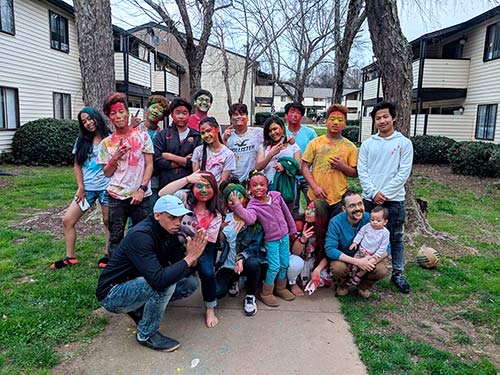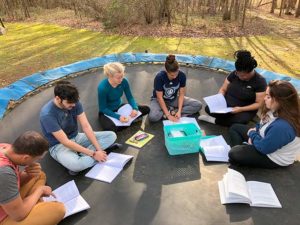



A focus on establishing new devotional gatherings has carried Charlotte, North Carolina, Baha’is past a milestone of having 100 ongoing core activities of community building.
More important, emphasis on these prayer meetings — open to all — has led to a “culture shift,” says Sam Kelleher, who serves as secretary of the committee appointed to coordinate efforts.
“Now it is almost a part of conversation, as in, ‘When do you have your devotional gathering?’ rather than ‘Do you have a devotional gathering?’”
Kelleher says an “increase in participation” also has been seen in the monthly Feast — nexus of Baha’i worship, planning and fellowship — and the local Baha’i Fund.
Through the Fund, Charlotte Baha’is support a rich array of programs — including Sunday morning talks, drum circles, youth activities and Holy Day observances — at the Baha’i Center in historically African-American Grier Heights and in neighborhoods throughout the city.
“One doesn’t know for sure, but it seems to be connected to growth in the devotional character of the community,” says Kelleher.
Not just starting but sustaining devotionals
Charlotte-area Baha’i communities were inspired in August 2018 to set a goal of having 95 regular devotional gatherings — up from about 30 — after learning that the four-state region aims to raise the number of such gatherings to 1,500 by the 200th anniversary of the Birth of the Bab, Herald of the Baha’i Faith, in October 2019.
They began, says Kelleher, by creating “reflection spaces,” in homes and at the Baha’i Center, for Baha’is and their friends to consider how to raise the community’s devotional character — connecting hearts to the transformative Word of God in informal settings.
“These events created an awareness of the existing devotional gatherings while allowing participants to catch a glimpse of how an emerging devotional culture contributes to the vibrancy of a community,” he says.
Momentum toward the goal was seen first in the Baha’i community’s South sector, which went from no devotionals to 11 within six months.
A Baha’i arose to visit families in that sector — one of four in the city — and encourage them to host gatherings, while another made “a supreme effort to attend numerous devotionals, usually bringing other members of the Baha’i community who were not able to drive themselves.”
Kelleher tells of a Baha’i who agreed to hold a devotional gathering on the second Saturday of each month.
“For the first gathering, the host didn’t prepare anything because they were not sure if anyone would attend,” he recalls. But the Baha’i who was making the rounds of devotionals “showed up with one other person and replied lovingly, ‘You said every second Saturday, so here we are.’
“The good news is that this host has been prepared to host her devotional every time since.”
The challenge now for the Baha’i community, Kelleher says, is to help meet the needs of those who have begun devotional gatherings.
Baha’i institutions have started to organize a support structure, “so that the more experienced hosts can support the newer hosts while still maintaining their own activities,” he says.


Youth in the vanguard
Vibrancy in Charlotte community life has been enhanced as well through the leadership of young people, says Mike Mastry, a regional coordinator for the institute that oversees training in the skills of community building.
A team of Baha’is “has been focused on reaching out to youth through the junior youth spiritual empowerment program and at the local community college through a campus group called Unity in Diversity,” says Mastry.
“Weekly youth nights have become a place for youths we’ve met on campus and from surrounding areas of North Carolina to rally together in prayer and fellowship and to encourage one another to sustain and intensify their efforts” to lead core activities.
When Baha’is and friends reach out to young people in neighborhoods, he says, meaningful conversations lead to invitations for these new friends to participate in institute camps. There the young people learn the skills of community building, and they’re given continuous support afterward when they offer acts of service such as mentoring children or junior youths.
“In the past year, close to 300 youths have been met through these efforts, more than 30 have begun studying an institute course, with close to 20 completing at least one course, and one youth has completed four courses,” says Mastry.
Increasingly, these young people are using their new understandings and skills to invite their friends to engage in service with them. And two young people embraced the teachings of Baha’u’llah after participating in a winter institute camp.
“The activity has not only brought greater vibrancy to the Charlotte Baha’i community by infusing youthful energy into community gatherings,” Mastry notes. “It has served to accelerate efforts in surrounding areas as well.”
Onward to the bicentenary and beyond
That increased energy is pointing Baha’is in the Charlotte area toward celebrations of the bicentenary of the Birth of the Bab in October that involve as many of their friends, family and neighbors as possible.
The 200th anniversary of the Birth of Baha’u’llah two years ago was marked with a community-wide celebration in a hotel and events at the Baha’i Center.
Baha’is were encouraged to hold more intimate gatherings in their homes but the Spiritual Assembly, the local Baha’i governing council, did not monitor how many of those took place, say Tamela Rich and James Pitts, chair and vice chair of the Assembly.
This time, the Assembly has set a goal of 200 home gatherings in addition to small community-wide gatherings and service projects.
“It will be upbeat and not as formal as our 2017 commemoration,” say Rich and Pitts, “with the goal of celebrating the auspicious occasion in a decentralized way that closely reflects the aims” of advancing community building at the neighborhood level.
All part of a shift in culture that’s well underway.


![]()
![]()
Whether you are exploring the Bahá'í Faith or looking to become an active member, there are various ways you can connect with our community.
Please ensure that all the Required Fields* are completed before submitting.